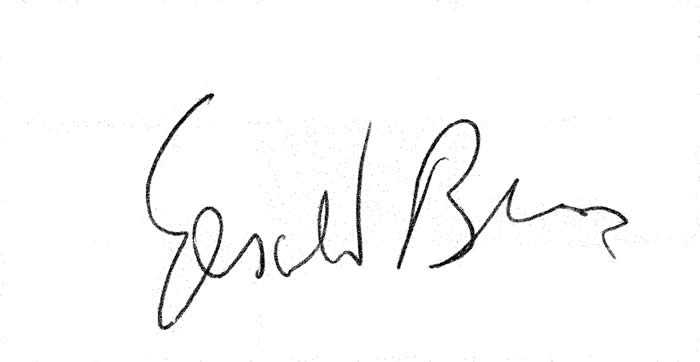
Willendorf
First, nothing that is real to me is real to you. That's why
you don't know how to look at my body, think to call my
hair "hyacinthine," tight little curls; for all you know it's beads
-- or small rolled bits of clay in early versions. I end a series.
You piece and roll words between thumb and fingers, and think
of me, my heavy body so lightly shaped as having been,
place me near two-day candles as if you think I thank
the light, contingent. I cast a shadow in the dark. My
breasts, hips, belly do not signify. Neither a sign (yes
I talk your jargon -- because, I told you once, I'm a copy)
nor strictly speaking presence, except to you. Burn
what you will; Ozymandize me you can't. Haven't,
to do you scant credit, my relation to time nothing you can
imagine. Walk into me. Even gender is not my game.
I sweated pollen, animal fats, before your shape was
shaped. I am gnomon, spindle me, cast a shadow
by my will in all directions. My body puts out candles.
The hump behind my neck's an accident of casting. I'm
on a base (but not your) toy farm animal. Suit
yourself if no flat surface you've is permeable.
Questions roll right off me. The moon is my left
breast, my right breast, my face. There is, where
I come from, no left or right. Hence my form.

I carry time on my wrist, though my watch is off, have looked fruitlessly
for the splendid Princeton book on Proust and Architecture, my heartbeat
irregular, satyr to anyone's Hyperion, or faun, about to dream of nymphs.
Picas in Aspic, title given me today by Edward Bell, at least as
good as Prunes and Prisms. Rain at my window sparkles like safety glass
frangibilized to ever-smaller fragments, like any fact in Proust. I did not buy
a clothbound New Directions Mallarmé, all that French, settle for Baudelaire's
Histoires Extraordinaires, the hands Stéphane's, voice a white raven's, my lovely attic,
in which I've been distrait, and consummately happy. No one makes a strontium
yellow oil paint any more, but Rebecca has given me a vintage Grumbacher Red.
For my wife a faceted plastic heart, backed with foil, to glue on a letter, mis à nu.
Why do I keep thinking of Alexander Smith, Spasmodist who declined into
that lovely little book Dreamthorp when critics pelted him with mud for his poems?
The history of people who wrote, their passion, is a bond. Even the highschool student writing badly
is writing. "Another outlet," you say, maybe Smith said, what is that? From Coleridge's poems
to projected philosophic opuses synthesizing everything, moonlit alternative to Cambridge Platonists,
last of his passion a leaf dangling in the wind, dancing, bistre fluttering in a grate, his son
Hartley's eyes in moonlight innocent as a Border ballad, fiddle with carved thistle at the scroll,
heads carved on harps with mouths open as if they sang. All are vulgarizable,
just a touch and they go bad, Keats's Lamia undone by a look, returned to serpentry
and Christabel with scales on her side as if the part of the poem that would be spoiled
had it been completed, or Hyperion, that self-destructive engine, apple in polyethylene that
bruises just there, where it touches the plastic, Merlin entering the cave in the Beardsley
drawing for Dent, Nimuë looking on, tangled floral border Beerbohm thought better
than anything in Morris, the picture offset to the left, giving space for leaves, young tree at an angle
matching Merlin's cloaked Dantesque hooded self. Ink spoke there, and in Salome's lovely
lean body laid to rest in a powder-box, coffin thinly labeled "FIN." These are close to jokes,
as if we have to be forgiven for going on, though not apologizing for what we do as Smith did.
Copyright Gerald Burns 1995-1997